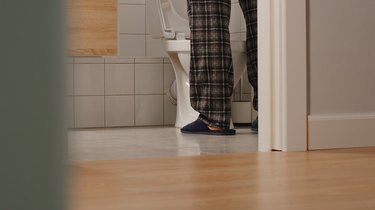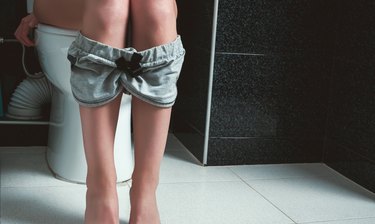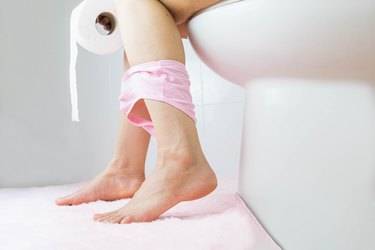
When your bladder doesn't feel empty after using the bathroom, you may be dealing with urinary retention. The condition, which is marked by an inability to fully empty the bladder, can be a side effect of numerous health problems.
As a result, figuring out the underlying culprit is a must for feeling better.
Video of the Day
Video of the Day
Urinary retention becomes more common with age, and people assigned male at birth (AMAB) are significantly more likely to be affected than those assigned female at birth (AFAB), according to the National Institute of Diabetes and Digestive Kidney Diseases (NIDDK).
In most instances, "a person will have a constant urge to urinate without being able to," explains S. Adam Ramin, MD, a urologic surgeon and medical director of Urology Cancer Specialists in Los Angeles. "It is a very uncomfortable sensation. The urge becomes stronger and stronger, but no matter what a person tries, they will not be able to urinate."
(In rare cases, certain neurological disorders can cause urinary retention to occur without the physical sensation of bladder fullness.)
This can lead to bladder damage, incontinence, urinary tract infections (UTIs) and even kidney damage.
Here's a look at some of the most common causes and the best way to manage the condition.
1. You Have a Blockage
Physical blockages in or around the bladder or the urethra (the tube that carries urine out of the body) can impede the flow of urine. Very often, this occurs when a person AMAB has an enlarged prostate.
"As the prostate gets larger, it obstructs the urethra and will now allow the urine to empty out," Dr. Ramin explains.
For people AFAB, blockages may be caused by a fallen bladder, also called a cystocele or bladder hernia, when the bladder bulges into the vagina. This can be caused by childbirth, chronic constipation or other strain on the pelvic muscles.
"In this situation, the urethra becomes angulated or kinked, leading to difficulty in emptying the bladder," Dr. Ramin says.
It's also possible for pelvic cancers to cause physical obstructions. These include prostate cancer, bladder cancer, urethral cancers and gynecologic cancers, Dr. Ramin notes.
2. It's a Medication Side Effect
Certain drugs can cause urinary retention. If you noticed that the problem began after starting a new prescription or over-the-counter medication, it could be to blame.
These types of meds all have the potential to affect bladder function, according to the Cleveland Clinic:
- Antihistamines (used to treat symptoms of allergies)
- Antispasmodics (which help suppress muscle spasms, including those in the gut)
- Opiates (prescription pain medications)
- Tricyclic antidepressants (used to treat depression)
- Anticholinergenics (often used to treat COPD, GI disorders, some bladder conditions and symptoms of Parkinson's)
- Certain blood pressure meds
- Antipsychotics (such as Haldol or Thorazine)
- Hormonal agents (used to treat certain cancers, such as breast or prostate)
- Muscle relaxants
3. You Have a Nerve Issue
Neurological problems can prevent normal signaling between the brain and the bladder and urethra, which could lead to trouble with bladder emptying. These include Parkinson's disease, multiple sclerosis, Alzheimer's disease, diabetes or birth defects like spina bifida, according to the NIDDK.
Injuries that occur from a stroke or vaginal birth, as well as spinal cord injuries, pelvic injuries or brain injuries can also cause nerve damage that may lead to bladder problems.
4. You Have an Infection
UTIs are another common cause of urinary retention, says Dr. Ramin, because they can create bladder weakness or swelling in the urethra.
Prostate infections and some sexually transmitted infections can also cause bladder swelling, which can lead to problems with retention, the Cleveland Clinic notes.
5. It's a Side Effect of Surgery
Anesthesia can temporarily paralyze the bladder, stopping you from feeling the need to urinate even if your bladder is full, Dr. Ramin says.
The paralysis is temporary, though. Once the anesthesia wears off, you should regain sensation in your bladder and be able to urinate normally.
6. You're Getting Older
It's not uncommon for the bladder muscles to weaken with age. This loss of strength can make it harder for the bladder to fully contract when you urinate, causing some urine to remain in the bladder, per the NIDDK.
That can lead to a sensation where you bladder doesn't feel completely empty.
Treatments for Trouble Emptying the Bladder
Treating urinary retention depends on the root culprit. "It's centered around the base cause leading to the retention," Dr. Ramin says.
1. Catheter
Acute urinary retention, which can happen from surgery or an infection, is typically treated with a catheter, which can quickly drain the bladder, per the Cleveland Clinic.
2. Medications or Surgery
Chronic or ongoing retention is often addressed with medications or surgery. Enlarged prostates can be treated with alpha blockers or surgery to reduce prostate size, Dr. Ramin notes, while urinary retention caused by a UTI may require antibiotics.
3. Over-the-Counter Supplements
Taking certain over-the-counter supplements can support prostate health and potentially reduce the likelihood of developing retention too.
Dr. Ramin recommends saw palmetto, pygeum or beta sitosterol. Always talk with your doctor before starting a new supplement, though, as some have side effects or can interact with medications you're taking.
What Not to Do
Steer clear of at-home bladder-emptying methods such as the Credé maneuver, which involves putting manual pressure on the bladder. These tactics, while widely circulated online, can do more harm than good.
"The additional pressure will cause transmission of pressure to the kidneys and cause damage," Dr. Ramin says.
These methods also don't address what's causing the retention in the first place.
"Without addressing the underlying causes, the disease may progress to cause kidney failure, sepsis, stone formation in the urinary tract and possible other complications," warns Dr. Ramin.
When to See a Doctor About Urinary Retention
Sudden, severe urinary retention can be life-threatening. You should seek emergency medical attention if you haven't been able to urinate for more than four hours, Dr. Ramin recommends.
Less severe symptoms warrant a call to your doctor. The NIDDK recommends contacting your primary care provider or urologist if you experience trouble urinating, frequent urination or urine leakage.
Was this article helpful?
150 Characters Max
0/150
Thank you for sharing!
Thank you for your feedback!
Is this an emergency? If you are experiencing serious medical symptoms, please see the National Library of Medicine’s list of signs you need emergency medical attention or call 911.


